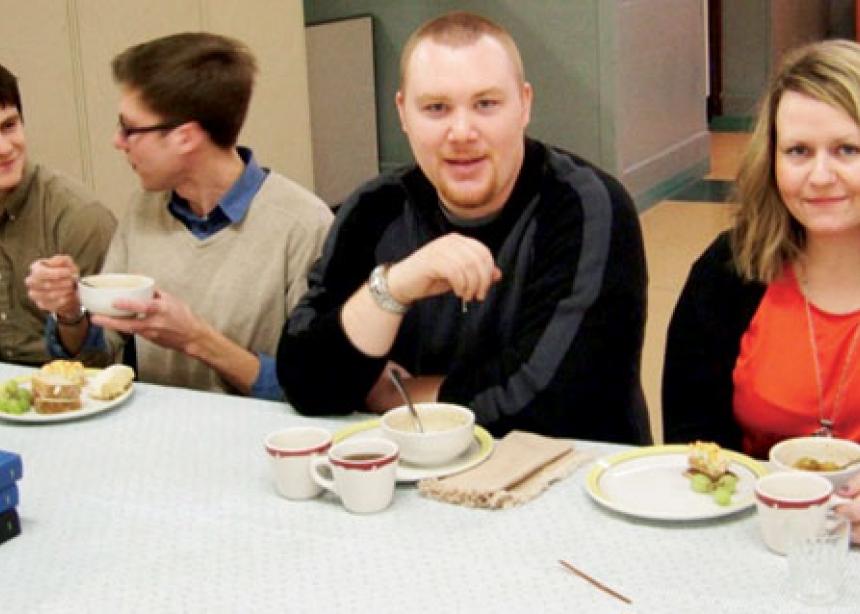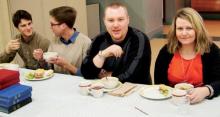Two neighbouring Winnipeg congregations, one Mennonite and the other Lutheran, decided to share their Sunday lunches and learn more about each other. In the process, they discovered that they had much in common.
For four consecutive Sundays in early 2012, members of Home Street Mennonite Church and First Lutheran Church met after their respective worship services to discuss the study guide, Healing Memories: Reconciling in Christ, which was jointly authored by Mennonite World Conference and the Lutheran World Federation in 2010, and the histories of their denominations, over potluck lunches served in one another’s churches.
“There was much laughter and comparison of soup recipes, explanations about sausages and Icelandic delicacies, and some bemusement about whether taco salad was a traditional Mennonite dish,” said Sue Sorensen, an English professor at Canadian Mennonite University and a member of First Lutheran.
They also engaged in conversations that moved them towards a deeper understanding of each other. “It was a very positive experience,” said Terry Zimmerly, pastor of Home Street Mennonite. “I wondered what difference the events of 500 years ago would make, but as we met with the Lutheran church we discovered that up until this event in Europe their official position was that the Anabaptists were heretics. It was written into their confession. So this was a pretty significant move for them.”
Zimmerly and Michael Kurtz, pastor of First Lutheran, began to discuss the possibility of a dialogue between the two churches when they attended a meeting of the West End Faith Project, an ecumenical neighbourhood faith initiative.
“We’re 10 blocks from each other; we have crotchety, beloved old buildings to keep up; our people come from similar backgrounds and have similar values,” noted Kurtz, adding, “And then we realized we had another connection.” It turns out that Susan Johnson, the national bishop of the Evangelical Lutheran Church in Canada, who is a member of First Lutheran, had worked with Janet Plenert, a member at Home Street, putting together a prayer of blessing involving the two denominations. “They were both present . . . in Stuttgart, Germany, in July 2010, when Lutherans officially apologized to Mennonites,” Kurtz noted.
“We discovered that we have much more in common that we thought we had,” said Zimmerly after they had completed the four sessions. “They have been changing and so have we. It was interesting to discover that they hold a strong peace and justice stance as well. Sometimes we think we kind of own that piece, but there are many Christians that resonate with that, and there are many in each of our congregations that don’t resonate with that position.”
“Historic major differences like infant baptism are no longer as wide as they once were,” observed Zimmerly. “The Lutheran church’s practice of confirmation is an adult commitment to the church and very much volitional. As a Mennonite denomination, we are recognizing more and more God’s grace towards us and there’s nothing we can do to deserve that. Child dedication in our congregation recognizes God’s gift of life to us, the gift of community and grace in the church. The differences are not as pronounced as in the past.”
“The Mennonites at my table, I suspect, would be hard-pressed to disagree with Martin Luther’s belief that ‘receiving baptism and living in it is the lifelong task of a Christian,’ ” Sorensen said. “Even though Winnipeg is a city where Mennonites and Lutherans are closely connected, we discovered during our study how much we still need to learn about each other.”
Sorensen recalled one member’s observation that “both denominations have been very ‘entangled’ in ethnic questions over the centuries, and those ethnic ties—for example, Icelandic Lutherans or Russian Mennonites—have often made us wish we could ‘disentangle’ ourselves.”
“Some of our best discussions in our Home Street-First Lutheran lunch talks revolved around what it means to forgive and be forgiven,” said Sorensen. “Some of us pondered the purpose of forgiveness 500 years after the Mennonite-Lutheran conflicts. As one participant said, ‘It’s God that forgives. God has already forgiven. What does it mean to forgive now?’ ”
Zimmerly is looking forward to the dialogue continuing. “We are exploring getting together to watch each other’s movies at the Ellice Theatre, a community theatre located between our two churches. The Radicals tells the Anabaptist story and Luther is a movie which tells the Lutheran story.”
“We are learning to hold our convictions just a little more lightly while, at the same time, honouring the necessarily strong convictions and passions of our past. Canadian Lutherans and Mennonites can be more humble in their relations with each other now,” Zimmerly suggested.
Meeting our neighbours
Lutheran and Mennonite congregations eat, pray and learn together
February 29, 2012 | God at work in the Church | Number 5
By Evelyn Rempel Petkau | Manitoba Correspondent



Add new comment
Canadian Mennonite invites comments and encourages constructive discussion about our content. Actual full names (first and last) are required. Comments are moderated and may be edited. They will not appear online until approved and will be posted during business hours. Some comments may be reproduced in print.